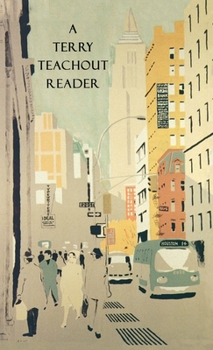A Terry Teachout Reader
Select Format
Select Condition 
Book Overview
Terry Teachout's thought-provoking observations on everyone from Louis Armstrong to The Sopranos , and on everything from American opera to serials on TV Terry Teachout, one of our most acute cultural... This description may be from another edition of this product.
Format:Hardcover
Language:English
ISBN:0300098944
ISBN13:9780300098945
Release Date:May 2004
Publisher:Yale University Press
Length:438 Pages
Weight:1.45 lbs.
Dimensions:1.4" x 5.8" x 8.3"
Customer Reviews
3 ratings
A mind of his own
Published by Thriftbooks.com User , 17 years ago
I know Teachout's work primarily from the musical criticism articles he frequently writes in 'Commentary'. A recent one was on the first American classical composer of distinction, Louis Gottschalk. The sense is that a great deal of research goes into each of his articles, and that research is in turn translated into a clear and comprehensible narrative which the reader can greatly enjoy. Teachout is the kind of writer who while having a clear and well- defined taste does not harangue the reader, or work at his conversion. It is a pleasure to read his pieces, and to learn from them.
The End of Post-Modernism; and the Return of Mid-Cult?
Published by Thriftbooks.com User , 19 years ago
If you are not already familiar with the work of the critic Terry Teachout, this fat, satisfying collection of his writing will turn you into a fan who keeps a lookout for his reviews (like me.) He started out as a musician but soon revealed a startling range of mastery of writing about theater, dance, literature and the movies. He is known as a conservative, although he strikes me as much more moderate in temperament than many of the more well-known red-hot leftists who write about the arts. And he's cosmopolitan enough for his writing to appear in the "New York Times" and "Washington Post" as well as "National Review" and "The New Criterion." In the introduction he declares what he has deciphered about the culture in the last 15 years: that strange time of "post-modernism" where no one believed that anything was real except the self, was ending in the 1990's even before the cataclysmic shock of 9/11. And that expired, unlamented "middle-brow" culture that existed before the 1960's may in fact point a way out of the morass.Teachout has an informal conversational style that nevertheless displays his great learning (very lightly.) Unlike a lot of critics, particularly self-conscious post-modernists, he is a lot of fun to read. It appears Teachout owes much of his allegiance to the great Modernist tradition that produced jazz, Aaron Copland, Leonard Bernstein, and Willa Cather; and the popular culture of Ed Sullivan, Chuck Jones, Dawn Powell, Frank Sinatra and Tom Wolfe. (Wolfe could be considered Teachout's Godfather or grey eminence.)Some of my favorite essays in this volume are: "Norman Mailer: Forgotten But Not Gone", a stinging take-down of Mailer's tattered reputation. "Stephen Sondheim's Unsettled Scores" in which Teachout proclaims "Sweeney Todd" the greatest American opera. "That Wascally Professor", his joyous analysis of the great old Warner Brother Looney Toons. "The New New Music", about the death of serialism, atonality, and the recovery of melody (and sanity) in classical music. "My Friend Nancy", his touching memoir of the too-soon deceased cabaret singer Nancy LaMott. "Tolstoy's Contraption", about how possibly the best writers today are not writing novels but making independent films (Whit Stillman, Darren Aronofsky, Kevin Smith, etc.) "Scoundrel Time", the definitive internment of the disgusting Lillian Hellman. "Seven Hundred Pretty Good Books", a nostalgic tribute to the fast-fading memory of the Book of the Month Club. Well, I could go on and on. Ther's also witty, insightful considerations of Camille Paglia, Tom Wolfe, John Steinbeck, Elvis, David Helfgott, John Sayles, Whittaker Chambers, 'The Sopranos"... This book is a feast, and if you are a fan of popular culture you can't afford to miss it.
Passionately Argued, Highly Reasoned Criticism
Published by Thriftbooks.com User , 20 years ago
This is criticism at its best, passionate, reasoned, engaged and engaging, grounded in strong values and beliefs. In the introduction to this volume, Terry Teachout notes that his only formal artistic training is in music. When he discusses other art forms, he says it as a "more or less will-informed amateur, not a practitioner." Still, the breadth and depth of his criticism is impressive: Teachout's interests include music, dance, literature, theatre. film, television and the visual arts. Teachout's insights help the reader to gain new dimensions of understanding and appreciation for familiar works; and he communicates his enthusiasm for the unfamiliar in a manner that makes the reader want to seek out the works he's celebrating.It's also a pleasure to read someone who leaves no doubt where their opinions lie. In his piece on mentally ill pianist David Helfgott, he doesn't shrink from describing what he sees as Helfgott's exploitation by his wife and others as a "sin." His look at Norman Mailer ("Forgotten But Not Gone") is as devastating an assessment of the celebrity author as was H.L. Mencken's famous obituary for William Jennings Bryan after the three-time presidential candidate dropped dead immediately following the Scopes trial. Teachout, by the way, is author of an excellent biography of Mencken. It's clear that he's learned from, and is following in the footsteps of, the best.--William C. Hall




